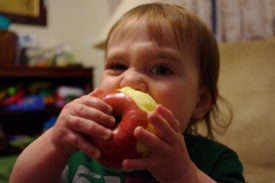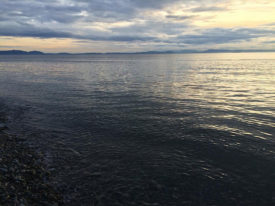Salmon farming, as is now widely practiced in British Columbia, has introduced a bevy of new threats to wild salmon survival, including disease, interbreeding, and localized pollution hotspots. It’s also ratcheted up pressure on marine food webs, with its demand for fish to feed to the penned salmon. (Salmon are predators. As Dick Manning has argued, raising them in captivity for food is like putting lions in feedlots and raising them on corn-fed beef. It’s an astoundingly wasteful food production system.)
Salmon farming is an example of what’s becoming one of the predominant sustainability challenges of our region: biological pollution. As exemplified by a Seattle PIreport on July 16, nonnative Atlantic salmon escape regularly from their pens. In the long run, such spills are as worrisome as oil spills from docks and tankers or radioactive leaks at Hanford.
And the sorry litany of problems and risks that have accompanied salmon farming has not dissuaded boosters of aquaculture from setting their sights on other species. The Juneau Empire reported on July 14 that a BC judge has given the green light to a company that wants to begin farming sablefish, or black cod, in Canadian waters off the Cascadian coast. The rationale offered by the judge was a disappointing loss for the precautionary principle-the idea of looking before you leap. The precautionary principle informs the North American approach to prescription drugs, and it increasingly informs the European approach to sustainability. When the risks to human and ecosystem health are great and knowledge of effects is limited, the precautionary principle says, the burden of proof should be on whoever proposes to introduce a new product, process, or other change.
The Juneau Empirenoted:
The judge based his decision on the absence of proof that farmed black cod would cause "irreversible damage," said Eric Wickham, executive director of the sablefish association. "He threw the burden of proof on us, and we think it should be on the government’s side."
To the judge, the appropriate response may be "codswallop!"








